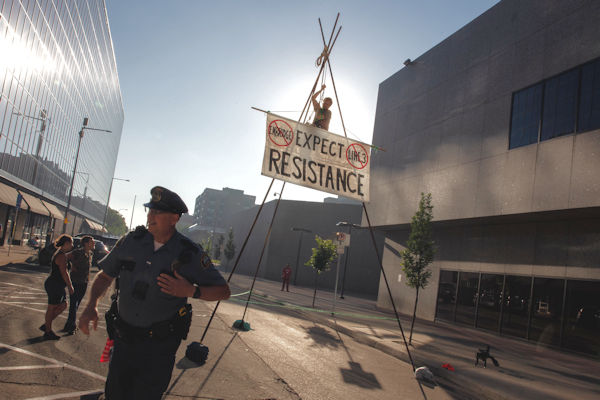SEJournal Online is the digital news magazine of the Society of Environmental Journalists. Learn more about SEJournal Online, including submission, subscription and advertising information.
 |
| States like Minnesota are considering joining others with strict anti-protest laws. Above, a police officer at a pipeline protest outside the Minnesota Public Utilities Commission in St. Paul, June 2018. Photo: Lorie Shaull, Flickr Creative Commons. Click to enlarge. |
TipSheet: Before You Cover That Pipeline Protest, Check the Law
By Joseph A. Davis
Can you go to jail for doing environmental journalism? Well, yes — if you live in the wrong state and are covering the wrong protest. And if you don’t have a phalanx of lawyers on your side.
A growing number of states are passing anti-protest laws aimed at pipeline activists and demonstrators at other energy or “critical infrastructure” facilities. If you step on the pipeline’s easement to cover them, you could be in for jail time too.
Case in point: Freelance journalist Karen Savage was covering a protest of now-completed Bayou Bridge pipeline in Louisiana in 2018 when she was arrested for felony trespassing under a new state law. This despite the fact that she and the protesters claimed to have a letter of permission from the landowner.
Savage and the others faced a potential sentence of five years. Now they are in court challenging the infrastructure trespassing law itself, partly on First Amendment grounds.
Critical infrastructure laws of special interest
The first thing is to know the law in your state. Long story short: There are a number of similar state laws you may need to know about.
The good thing is there are several groups tracking them. But complicating matters is that the critical infrastructure anti-protest laws do vary, that they blend in among the many other anti-protest laws and that more may be on the way.
Critical infrastructure laws are of special interest to environmental journalists because they not only apply to pipelines, but may sweep in other facilities that impact the environment. These might include powerlines, dams, port facilities and refineries.
States with critical infrastructure protest laws on the books, besides Louisiana, now include Arkansas, Indiana, Kansas, Kentucky, Mississippi, Missouri, Montana, North Dakota, Ohio, Oklahoma, South Dakota, Tennessee, Texas, West Virginia and Wisconsin.
One bill is pending in Minnesota,
where protests against Enbridge’s
Line 3 oil pipeline are currently very active.
The good news is that others were defeated in many other states. The bad news (there’s always bad news) is that some are still pending bills in other state legislatures. Pending states include Minnesota, where protests against Enbridge’s Line 3 oil pipeline are currently very active.
Tracking anti-protest laws and bills
One good way to track these laws is with the U.S. Protest Law Tracker run by the International Center for Not-for-Profit Law. It tracks other kinds of anti-protest bills and laws, so filter for “infrastructure.”
The laws vary in many ways. Some merely enhance penalties in existing laws. Others create civil liability. The heavy jail sentences included in some are inconsistent with past practice in most states regarding nonviolent protest.
The general pattern for the laws seems to be derived from model legislation put forth by the conservative, Koch-funded American Legislative Exchange Council (ALEC), which is still pushing them. A key advocate behind the ALEC moves is the American Fuel and Petrochemical Manufacturers, a lobby group.
Other groups tracking various kinds of anti-protest laws include the American Civil Liberties Union and Greenpeace’s PolluterWatch.
And if you are covering protests, there are plenty of other things to be ready for. The Reporters Committee for Freedom of the Press has published a handy practical checklist as well as a longer legal guide.
Joseph A. Davis is a freelance writer/editor in Washington, D.C. who has been writing about the environment since 1976. He writes SEJournal Online's TipSheet, Reporter's Toolbox and Issue Backgrounder, as well as compiling SEJ's weekday news headlines service EJToday. Davis also directs SEJ's Freedom of Information Project and writes the WatchDog opinion column and WatchDog Alert.
* From the weekly news magazine SEJournal Online, Vol. 6, No. 22. Content from each new issue of SEJournal Online is available to the public via the SEJournal Online main page. Subscribe to the e-newsletter here. And see past issues of the SEJournal archived here.

















